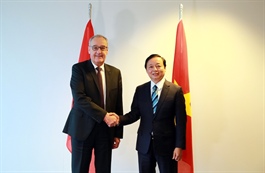European business community confident in Vietnam
European business community confident in Vietnam
With Vietnam's strong economic fundamentals, and its commitment to sustainability, the European business community remains strongly confident in the Vietnamese market.
Alain Cany, chairman of the European Chamber of Commerce in Vietnam (EuroCham) made the statement when commenting on the Business Climate Index (BCI) released on January 12.
“Things were definitely less positive in the fourth quarter of 2022 than they were earlier in the year. Although the situation is very likely to continue in this direction in 2023, this should not be viewed as a cause for concern. In fact, Vietnam's economic opportunities continue to exceed those of its regional and international peers. This is evident from the fact that so many of EuroCham's members consider Vietnam central to their global investment strategies,” he said.
“It is also encouraging to see that foreign direct investment from Europe and around the world remains high and continues to grow, especially in Vietnam's green industries and manufacturing. It is clear that, with this FDI, Vietnam's strong economic fundamentals, and its commitment to sustainability, the country is still among the top investment destinations in the world."
Barriers remain
According to the BCI produced by YouGov Decision Lab, European business stakeholders' perception of Vietnam's business climate fell to 48 in the fourth quarter of 2022. This was a drop of 14.2 points compared to three months ago and 25 points from the first quarter of the year.
Though Vietnam's economy grew by 5.92 per cent in the fourth quarter of 2022 year-over-year and 8.02 percent for the whole year, this data comes amid continued global economic volatility resulting from a perfect storm of factors including a slowdown in global growth, interest rate hikes, sustained inflation and bruised consumer confidence.
The BCI is the leading indicator of the European business and investment community in Vietnam. To better understand the Vietnamese market, EuroCham invites its 1,300 members, who represent virtually all sectors of the Vietnamese economy, to provide quarterly feedback on Vietnam's business environment and forecasts for their own businesses in Vietnam.
With only 27 per cent of respondents anticipating economic stabilisation or improvement in the first quarter of 2023, the BCI results also suggest a growing sense of pessimism. As compared to projections for the fourth quarter of 2022, when 42 per cent shared this sentiment, this is a 15-point decline. Over the past quarter, the number of people who anticipated an economic downturn also doubled.
Nevertheless, Vietnam remains a global investment destination. According to the BCI, 41 per cent of respondents stated their company is shifting operations from China to Vietnam, up from 13 per cent in the third quarter. Furthermore, approximately 35 per cent of respondents ranked Vietnam among the top five global investment destinations for their company, with 12 per cent stating that Vietnam was their firm's top investment site internationally.
To increase attraction, removing barriers is a decisive factor. The BCI added the three most significant regulatory barriers to foreign companies operating in Vietnam were identified as a lack of clarity regarding rules and regulations (51 per cent), administrative issues (41 per cent), as well as visa and work permit difficulties (30 per cent).
Despite these difficulties, 58 per cent of BCI respondents were satisfied with the attention policymakers pay to business needs when setting relevant policies.
In terms of what Vietnam should do to improve its FDI attraction prowess, reducing administrative difficulties (70 per cent) retained the top spot. This has been the case since this question was first raised with BCI respondents in the second quarter of 2022. Meanwhile, the issue of reducing visa difficulties for foreign experts has become increasingly pertinent, increasing 8 points from the third-quarter to the fourth.
EVFTA impact
According to the survey, 63 per cent of respondents believe they are sufficiently knowledgeable about the EU-Vietnam Free Trade Agreement (EVFTA). Moreover, nearly half of respondents maintain that the EVFTA is relevant to or very relevant to their business, indicating no significant change from the third quarter of 2022.
BCI participants also reported that the new-generation free trade agreement had a positive effect on the growth of their businesses, their financial health through tariff reductions and the strength of their supply chains.
This latest BCI shows that concerns regarding the EVFTA's administrative procedures, a lack of understanding of the agreement and technical barriers to trade have all decreased.
CEO of Decision Lab Thue Quist Thomasen said that the fourth quarter of 2022 shows an acceleration of the decline that started in the second quarter, when global indicators of volatility, inflation and slowing growth began to have an impact on the sentiment in Vietnam.
“The fourth quarter has seen domestic volatility in banking and real-estate sectors especially and this may have affected the sentiment of foreign investors to the extent where they are now slightly pessimistic about the future economic environment. Not all sectors share this sentiment though and sectors directly relying on local consumption are generally more positive in their outlook,” he added.






















